11. May 2022 - DOI 10.25626/0137
Veronika Pehe is a Marie Sklodowska-Curie Fellow at the Institute for Contemporary History of the Czech Academy of Sciences. Her research focuses on the contemporary cultural history of Central Europe, in particular the intersection of memory, culture and politics. She holds a PhD from the School of Slavonic and East European Studies, University College London (2016) and is the author of Velvet Retro: Postsocialist Nostalgia and the Politics of Heroism in Czech Popular Culture (2020).
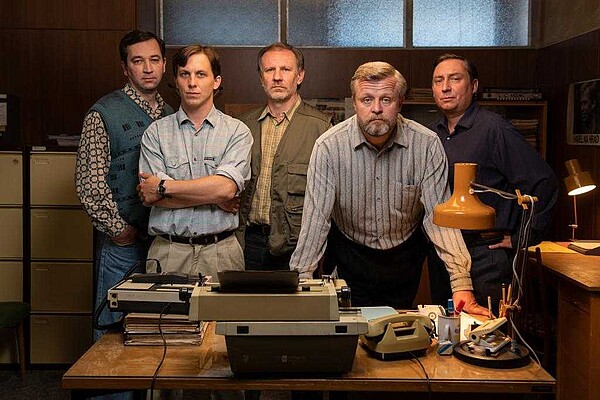
In January 2022, Channel One of Czech public television began broadcasting a new prime-time show. Laconically titled Devadesátky (‘The Nineties’), the six-part series reconstructs the most notorious cases of violent, organized crime during the first post-socialist decade in the Czech Republic. With its meticulous period costumes and sets, and a cast of both well-known actors and promising newcomers, The Nineties has become the most successful domestic television series in nearly two decades, with each episode attracting almost half of all television viewers during its broadcast. Clearly, the crime-ridden vision of early capitalism that the series presents has resonated with audiences. But it has also sparked a number of critical reactions and polemics about the type of shared image of the 1990s that Czech society should have. Apart from the standard reviews, the daily newspaper Lidové noviny commissioned an entire series of articles assessing the 1990s from different perspectives, while the daily Mladá fronta Dnes published a series on crime in Southern Moravia in the 1990s; moreover, guests have been invited to comment on The Nineties on television talk shows; public debates about the show have taken place, while historians have been invited to discuss the series on public radio programmes. In this sense, The Nineties has become a successful ‘medium of memory’, which has triggered a much-delayed and necessary public debate on the successes and failures of the transformation era.
It is not surprising that such a debate has been sparked over a television series. Unlike other post-socialist countries, the Czech Republic has, up to this point, largely avoided political and social debates on the legacies of the political and economic transformation of the 1990s, and further, how this decade informs the various problems and challenges that Czech society faces today. In the absence of a larger public debate, the memory of the 1990s has mainly been shaped by popular culture. Yet, an entire range of films, TV series, podcasts, books and memoirs have already sought to capture the defining features of the transformation era. So why is it that The Nineties has only now stirred up such a discussion?
In many post-socialist countries, it is the systemic transformation that is increasingly becoming the object of mnemonic conflict as opposed to the socialist past, which had animated both memory politics and cultural memory for at least the first quarter of the century following the collapse of the communist regimes in Eastern Europe. In some of the Czech Republic’s neighbouring countries such as Poland, the transformation is not only the subject of lively scholarly debate in the social sciences, but it has also produced a whole range of literary reportage, as well as publications aimed at the general public that focus on the social costs of transformation, particularly the costs resulting from of the privatization of state-owned enterprises and its concomitant rise in unemployment. Of the many examples, Aleksandra Leyk and Joanna Wawrzyniak’s acclaimed 2020 book Cięcia (‘Cuts’) conveys the memory of the upheavals of transformation through the life stories of industrial workers who were caught up in the processes of privatization after 1989; despite its scholarly rigour, Cięcia is highly readable and engaging.[1]
The 1990s and the transformation have also been exploited in the political narratives of both ruling and oppositional political groups across the region. In Poland, the Law and Justice party (PiS) has actively contested the liberal achievements of 1989 in a quest to legitimize their conservative revolution, portraying the 1989 round table and subsequent transformation as an opaque deal between former communists and liberal oppositionists that in fact preserved many key features of the communist system in the new era. From this position, PiS claims that only they can accomplish a truly “good change” (dobra zmiana). In Germany, far-right and populist forces such as the AfD or Pegida have also constructed the memory of 1989 as an “unfinished revolution” and a betrayal (encapsulated in the AfD’s slogan “Vollende die Wende!”) and have sought to mobilize resentment against the unequal development of East and West Germany during the transformation era.[2] As scholars have shown, Russia’s president Vladimir Putin has built his legitimacy on differentiating his rule from the trauma of the “wild” or “rough” 1990s.[3]
In the Czech Republic, populist actors have thus far not been particularly interested in stirring mnemonic conflicts. As I have discussed previously, the former Prime Minister Andrej Babiš, who has been described as a populist, has been accused of collaboration with the communist secret police.[4] Babiš’s strategy has been one of mnemonic abnegation – he has simply not been interested in using the socialist past instrumentally for his claim to power. Instead, he built his political career on an anti-corruption narrative that targeted the mainstream parties established in the 1990s – a strategy that chimed with voters disappointed by post-1989 developments. Babiš was able to successfully build on a longer tradition of critique of the clientelism and “mafia capitalism”, to use Václav Havel’s term, which had flourished under the leadership of Václav Klaus’s Civic Democratic Party (ODS) during the 1990s. After ODS lost the parliamentary elections in 1997 during a recession and faced a corruption scandal, critique of ODS’s transformation strategy became part and parcel of Czech political discourse, with the Social Democrats taking on the ODS by using the phrase of “scorched earth” in reference to the results of Klaus’s transformation policy. More recently, a relative newcomer to the Czech political stage – the Pirate Party – has also been vocal in criticizing the unfulfilled promises of the transformation. Yet since becoming part of a victorious right-wing coalition government in the fall of 2021, their criticism has been blunted by their collaboration with none other than the ODS.[5]
Yet despite this ongoing evaluation of the transformation era in political discourse, it remains the case in the Czech Republic perhaps more than in other postsocialist countries that the liberal-conservative mainstream, whether on the political level or in the media, maintained a strong anticommunist orientation. This anticommunism, expressed as a wholesale condemnation of the pre-1989 era, also precluded explicit criticism of the liberal transformation – most certainly its aims, and to a large extent also its results. Czech politics has thus not witnessed as strong a critique nor political instrumentalization of the legacy of the 1990s as in neighbouring countries.
Up until recently, the main political-memory conflict in the Czech public sphere has been concerned with the socialist period, especially in the highly politicized battles over the mission and course to be taken by the Institute for the Study of Totalitarian Regimes, set up in 2007. While one camp has taken up the ‘totalitarian’ position, arguing that the study of communist rule should primarily be dedicated to exposing the regime’s crimes and repressive apparatus, social and cultural historians and parts of the left have called for a more complex understanding of the regime’s underpinnings through the study of topics beyond repression, including everyday life.[6]
Often, it is the conflict about the socialist past that serves as a proxy for arguing about the legitimacy of the transformation. This was especially visible in a 2020 debate around a controversialinterview with historian and Dean of the Faculty of Arts of Charles University at the time, Michal Pullmann. In the interview, Pullmann made several comments that questioned the totalitarian interpretation of the communist regime. For some conservative critics, this was clear ‘proof’ that Pullmann was an apologist for a criminal regime and that he was either explicitly or implicitly supporting the Communist Party of Bohemia and Moravia (Komunistická strana Čech a Moravy, KSČM) and, by virtue of this, also Prime Minister Andrej Babiš of the ANO (‘Yes’) party, whose minority government was supported by the KSČM at the time of the interview. The memory of the communist regime as totalitarian and thus demanding active denunciation was predominantly employed by conservative media commentators in order to construct and consolidate a collective memory in defence of the liberal-democratic values of the post-1989 transformation. In their argument, anyone who questioned the criminal nature of the communist regime was also questioning that the course taken by Czech liberal democracy after 1989 had been the right one. And this was a position that many influential commentators were unwilling to accept. The conflict over the legacies of the transformation thus remains rather veiled.
In the absence of a lively political debate, the memory of the 1990s up until now has largely been framed by popular culture in the Czech Republic.[7] A number of popular commercial films had already shaped the shared images of the arrival of capitalism in the 1990s. Movies such as Slunce, seno, erotika(‘Sun, Hay, Eroticism’, dir. Zdeněk Troška, 1991), Dědictví aneb kurvahošigutntág(‘The Inheritance or Fuckoffguysgoodday’, dir. Věra Chytilová, 1992) or Konec básníku v Čechách (‘The End of Poets in Bohemia’, dir. Dušan Klein, 1993) have become part of the pop-cultural canon, seen by hundreds of thousands in cinemas and by millions in frequent television reruns that continue to this day. Arguably, these popular films from the 1990s play a role in Czech society as ‘media of memory’ of the 1990s and lend themselves to multiple interpretations. On one level, their garish B-movie aesthetics invite a camp appreciation of the specific visuality of the 1990s: the fashion trends, hairstyles, cars, objects, analogue technology and colours of the decade. On the narrative level, these films actualize the myth of the 1990s as a decade when “anything was possible”, telling tales of sudden enrichment, dodgy business practices and cultural shock at encountering the West for the first time. But on the ideological level, these pictures did not cheerlead the neoliberal transformation. Rather, they satirized and cautioned against inflated expectations as to Czech people’s ability to quickly transform into savvy actors on the free market. The tales they tell are usually stories of confusion and disorientation in the face of new capitalist realities. The hero of Chytilová’s Inheritance is a case in point – having suddenly inherited a considerable fortune, the coarse villager Bohuš has no idea how to manage his newly-gained capital. His money cannot buy him love or happiness, and he ends up squandering his wealth.
The popular comedies of the 1990s were significant in compounding a number of myths and stereotypes that frame the post-socialist transformation to this day. In their often tabloid-style subject matter, they pandered to a demand for portraying new social phenomena that had been practically absent from Czechoslovak society under state socialism. These included explicit sex and visible prostitution, violent organized crime, human trafficking, and drug use to name just a few. The mediation of these themes, which not only occurred through popular culture, but especially in the press, on television and radio, contributed to associating the image of the onset of capitalism with criminality and informal practices enabled by the lack of regulations – a particular historical constellation that is generally referred to in public discourse by the shorthand, the ‘wild 1990s’.
But this ‘wildness’ is by no means only associated with negative phenomena. It is equally applied to the memory of a decade that brought unprecedented opportunities in terms of freedom of expression, travel, business and other areas of life. The narrative is perhaps best captured in the title of one coffee-table book published in 2017: The Free and Wild 1990s: Stories from a Time When Everything Was Possible.[8] Such a positive memory of the 1990s is most-often formulated by those who entered adulthood or were at the most in their early thirties just as the communist regime collapsed in 1989. This demographic, especially those with an education and living in larger urban centres, experienced the 1990s as “the best decade of their lives” – a view confirmed by a large-scale oral history project that was carried out between 2017 and 2019 at the Institute of Contemporary History of the Czech Academy of Sciences with former participants in the student strikes of 1989 that sparked the Velvet Revolution.[9] Members of this generational cohort, who were catapulted into positions of influence through the historical conjuncture of the Velvet Revolution, continue to occupy important discourse-influencing positions. As such, it is hardly surprising that their triumphalist narrative of the post-1989 transformation has so far dominated the Czech public sphere.
Apart from the trope of the ‘wild 1990s’, the cultural memory of the decade has revolved around the motif of the ‘bizarre’. The word functions as a noun in Czech and has become a widely used label for phenomena of the 1990s that from today’s point of view appear odd, unfamiliar, deficient or grotesque primarily for their lack of taste. Something bizarre can only be identified as such from a position of superiority, from the knowledge that we can appreciate the poor taste, as well as aesthetic and even moral deficiencies of the period, because we have now moved on and gained the necessary cultural and social capital to interpret the past as inferior to the present.
Such a position appeared in a most pronounced way in the best-selling, richly illustrated book by journalist Johana Fundová entitled, Devadesátky! Roky nespoustané svobody (‘Nineties! Years of Unfettered Freedom’) – the exclamation mark serving as a symbol of the camp garishness that accompanies the notion of the bizarre.[10] Most of the phenomena that Fundová identifies as bizarre – including the mullet hairstyle, particular fashion trends, old-school technology, the high social valuation of fast-food chains, opulent villas of the nouveau-riche – acquire their retrospective oddity from being unsuccessful imitations of Western iterations of consumer society, the implication being that by now, Czechs have learned how to do consumerism correctly.
In its popular usage, the ‘bizarre’ has become decoupled from the political and economic circumstances that gave birth to the everyday phenomena it describes. An early attempt to capture the everyday experience of the 1990s as embedded in larger historical events was made by another flagship series of Czech public television – Vyprávěj (‘Tell Me a Story’), broadcast between 2009 and 2013. Telling the story of an ‘ordinary’ Czecho-Slovak family from the 1960s until the present, Tell Me a Story tackled the events of economic and political transformation in its fourth and fifth series. While focusing primarily on the personal dramas and relationships between the characters within the conventions of the soap opera, the series also set these stories against such events as voucher privatization or the publication of a list of former secret police collaborators. Yet, while the pleasing retro-aesthetics against the backdrop of historical events formed a functional model in the series’ early seasons that portrayed the pre-1989 period, its representation of the 1990s failed to convince in the same way. It seems that at the beginning of the 2010s, the time was neither ripe for a pop-cultural reckoning with the transformation nor for a retrospective appreciation of the decade’s visuality. Both would require a series of further mediations.
Perhaps the latest TV-series, The Nineties,has managed to draw such attention from both audiences and the media because it does not rely on either of the memory tropes discussed above. Instead, it continues a quite substantial tradition of ‘police memory’ in relation to the 1990s. The commercial cinema of the 1990s had already suggested that the onset of capitalism was inextricably linked with banditry and criminality – a cultural trope that is also pervasive in other post-socialist contexts such as Poland and Russia where their crime-action films of the 1990s ranked amongst the most successful products of their domestic film industries. Such films appealed to a wide audience not only because of their successful application of visually spectacular genre-filmmaking to domestic circumstances, but also because the linking of criminality and capitalism ultimately lends itself to illiberal, populist interpretations that critique the new liberal order as inherently decayed and built upon informal transfers of power of former communist nomenklatura into the new elites.
The Nineties can be read in a similar fashion. In the Czech case, ‘police memory’ of the 1990s is either narrated by former members of the police or by investigative journalists – i.e. those who stand with the law and attempt to serve justice in a situation of upheaval where the moral integrity of law enforcers cannot automatically be counted upon. Indeed, the screenwriter of The Nineties, Josef Mareš, is a former police investigator. The events dramatized in the series – including the ‘Orlík murders’ and the murder of the wife of influential night club owner, Ivan Jonák – have already been recounted and explored in many earlier mediations. These include the books of investigative journalists Josef Kmenta and Josef Klíma, the memoirs of detective Karel Tichý, the podcast České podsvětí(‘Czech Underworld’) and the documentary series Polosvět(‘Halfworld’), broadcast simultaneously with The Nineties.
From this perspective, The Nineties are hardly a new representation, but rather a ‘remediation’ of already often-presented material. And as memory scholars Astrid Erll and Stephanie Wodianka have argued, remediation is one of the key components of “plurimedial networks” in which cultural artefacts need to be embedded in order to function as media of memory.[11] In other words, the strength of The Nineties lies in giving an attractive new form and amplifying already well-known and circulating narratives.
The series thus does not present something new, but still manages to avoid the patterns of representation described above. The ‘bizarre’ practically does not make an appearance, apart from the playful title sequence of each episode, which edits together period footage of news, celebrities, politicians and material phenomena. The trope of the ‘wild 90s’ features not in its version as a time of ‘absolute freedom’, but rather as a wild time without regulation and legal frameworks that fostered all kinds of social pathologies. ‘Police memory’ offers an answer through reassurance that somewhere, there is always a bunch of good guys (almost never women), who are fighting for justice and are meant to convince us that all will be well. It is here that police memory chimes with the popular anti-corruption narrative, so skilfully exploited by populist actors. In this way, it remains double-edged. On the one hand, ‘police memory’ is affirmative of the post-socialist order (after all, it sides with the power of the state), but on the other hand, it does not avoid the darker sides of the transformation through criminalizing capitalist reality. It is in this double-edged nature of the series that I see as its broad mnemonic appeal and the reason why it has been this particular cultural artefact that has provoked such a broad discussion.
Until recently, Czech public discourse tended to speak about the transformation in the 1990s in the binary categories of winners and losers (or to depoliticize the era completely in the case of the aestheticization of the bizarre). It is hardly surprising that influential commentators belonging to the generation of 1989 were somewhat offended by the negative portrayal of the decade in the TV series and wrote defensive pieces about their own euphoric memories of a time of unprecedented freedom. This line was most effectively summed up by the headline of a column by Petr Honzejk in the daily, Hospodářské noviny: “That’s enough, kids. The nineties were not criminally dark, they were great!”[12] Somewhat erroneously, Honzejk considered his opponents to be members of a more critical and left-leaning younger commentariat. While this is certainly a group that is ready to criticize the social costs of the transformation, it should be noted that the producers of police memory are of Honzejk’s generation, sometimes even older – they are journalists and police officers who started their professional careers in the 1980s or 1990s. It would thus not be completely accurate to portray the current Czech debate as a generational clash, even if media like to frame it that way. For instance, even before the airing of The Nineties, one quality magazine published a double interview with two economists – one former actor in the neoliberal reforms of the 1990s, the other, his younger, more critical colleague – entitled, “A clash of economic generations”.
Nevertheless, the debate around the TV-series has displayed a certain qualitative shift in that both positive and negative assessments of the transformation period have not necessarily been presented as mutually exclusive by its participants. In a way, the discussion has thus echoed the conclusions reached by Kristen Ghodsee and Mitchell Orenstein in their 2020 book, Taking Stock of Shock, that the transformations in Eastern Europe were simultaneously successes and failures.[13] The explanation lies in the rise of inequality which allowed certain groups to benefit from the economic and political changes, while others suffered. Needless to say, this interpretation was not meet with much understanding from the liberal policymakers of the time, who tend to defend the course of the transformation and brush its social impact aside. Ghodsee and Orenstein’s book thus received indignant criticism from former Prime Minister and chief architect of the economic transformation in the Czech Repulic, Václav Klaus, in the daily Právo.[14]
Yet, some prominent commentators, including those who until now had generally embraced the positive narrative about the unquestionable triumph of freedom in the 1990s, began to formulate an interpretation that to an extent resonated with Ghodsee and Orenstein’s more ambivalent conclusions. Journalist Zbyněk Petráček, an editor ofthe leading liberal weekly Respekt in the 1990s, now a contributor to the daily Lidové noviny, voiced this position most concisely. He contrasted the narrative of the ‘wild’ (in the sense of unregulated and criminal) 1990s in the series with the ‘wild’ (in the sense of absolutely free) 1990s as represented in the 1994 film, Jízda(‘The Ride’, dir. Jan Svěrák). This ultra-low-budget road-movie became a kind of generational testimony for young people authentically enjoying new-found, seemingly boundless freedom. According to Petráček, there are two competing narratives within Czech society, where the 1990s are either “just an off-putting example of a time that gave birth to theft of state property and organized crime, or a lost paradise of times of absolute freedom.”[15] Petráček adds that “it would be more logical to acknowledge that [these] opposing perspectives do not have to be mutually exclusive. That often they are two sides (…) of the same coin.” Similar conclusions, if less explicitly articulated, have been reached by other commentators on the pages of Lidové noviny and Echo 24, even if they all admit they belonged amongst those who remember the 1990s warmly.
Acknowledging the contradictory nature of the 1990s and hence the legitimacy of different memories signals a shift in memory culture. Cultural memory has a tendency to tell simple stories about the clash of good and evil. This thesis is best illustrated on Czech post-1989 cinematic representations of the communist past – whether hit comedies such as Jan Hřebejk’s Pelíšky(‘Cosy Dens’, 1999) or dark dramas such as David Ondříček’s crime thriller Ve stínu(‘In the Shadow’, 2012). In such films, communists are always the ‘others’, while the audience is asked to sympathize with characters who express opposition towards the communist regime. Although The Nineties essentially reproduces a similar pattern in its dramatization of the clash of likeable police officers with despicable criminals, the media’s reactions to the series indicate that the mainstream debate about the transformation era is beginning to take into account the diverse experiences of different parts of the population. That is the first step towards a pluralistic reckoning with the legacies of this decade in Czech society.
This article is part of a project that has received funding from the European Union’s Horizon 2020 research and innovation programme under the Marie Skłodowska–Curie grant agreement No 749475.
Veronika Pehe: ‘The Nineties’ on TV: Remembering the Transformation Era in Czech Popular Culture. Cultures of History Forum (10.05.2022), DOI: 10.25626/0137.
Copyright (c) 2022 by Imre Kertész Kolleg, all rights reserved. This work may be copied and redistributed for non-commercial, educational purposes, if permission is granted by the copyright holders. For permission please contact the editor.
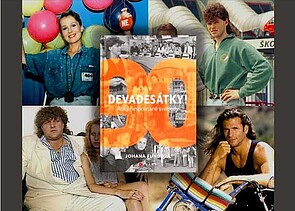
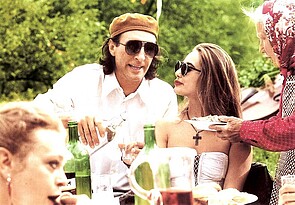
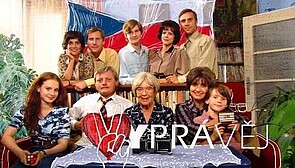
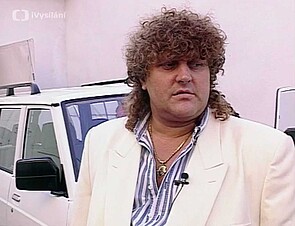
Here is the Official Trailor to the TV Series 'Devadesátky' (2022)
Patrick Metzler · 21.12.2022
Localizing “Our Germans”: The New Permanent Exhibition in Ústí nad Labem
Read more
Jiří Smlsal · 25.01.2022
The Stench of Pigs and the Authority of Historians: Czech Debates About the Lety Concentration Camp
Read more
Karolína Bukovská · 25.11.2021
(Re)construction of Czech History: The National Museum and its New Permanent Exhibition on the Twent...
Read more
Veronika Pehe · 21.07.2021
Czech Prime Minister Implicated as Communist Secret Police Agent – Yet Nobody Cares
Read more
Jakub Vrba · 18.12.2020
Monumental Conflict: Controversies Surrounding the Removal of the Marshal Konev Statue in Prague
Read more
Get this article as PDF download (including pictures).